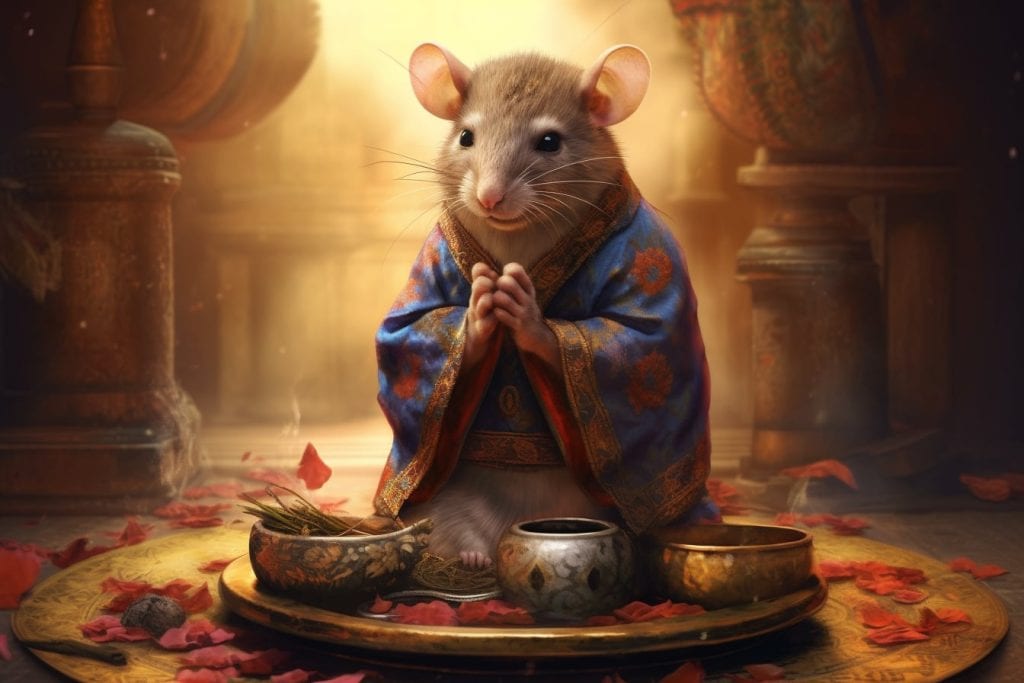The representation of a rat is diverse and changes from culture to culture. Rats are frequently linked to negative elements like filth, illness, and devastation in several societies, predominantly due to their historical involvement in disease dissemination such as the bubonic plague. Yet, they are also celebrated for their distinct attributes. Rats are acknowledged as neat, friendly, and intelligent beings. Their intellect is often underscored in scientific studies, thereby tying them to science and advancement. 1
In certain cultures, rats symbolize wealth and achievement. For instance, within Chinese tradition, the rat embodies wisdom, affluence, and prosperity. It holds the position of the first animal in the Chinese zodiac, signifying its esteemed status. In some Indian traditions, rats are venerated and safeguarded within temples, as they are believed to be a rebirth of the Goddess Karni Mata. The sighting of a white rat among the usual black and brown ones is regarded as a powerful symbol of good fortune. 2
Table of Contents
Rat Symbolism in Dreams
The interpretation of dreams is a fascinating subject, however, it can be quite challenging, as it requires taking into account the dreamer’s personal associations and possibly significant events in their life. Our approach to interpreting dream symbols follows the psychological perspective.
Dreams about rats can be interpreted in various ways, often reflecting one’s personal feelings and experiences with these creatures. For some, rats may symbolize anxiety, obstacles, and insecurities, particularly related to finances or personal relationships. This is because rats are often associated with situations of stress or difficulty, such as infestations or disease. 3
On the other hand, dreaming of rats can also signify overcoming challenges. For instance, a dream about catching rats might suggest that you are successfully navigating through complex issues in your life. This interpretation aligns with the rat’s reputation for adaptability and resourcefulness, traits that can be seen as positive when dealing with life’s hurdles. 3
What Does a Dead Rat Represent?
The symbolism of a dead rat is often associated with warning signs and changes. Seeing a dead rat can be a cautionary signal about potential betrayal. It advises you to be careful about who you trust and to keep your secrets close. Alternatively, it might be a message warning you not to betray others. 4 5
Moreover, a dead rat can symbolize a lack of adaptability or motivation. If you’ve been struggling with certain problems in your life, the appearance of a dead rat might suggest that you need to adjust your approach or find new ways to tackle your issues. It could also indicate a need for perseverance and determination to fight for the things you want and believe in. 5
What Does a Rat Represent?
Rats, despite their negative connotations, are often seen as symbols of wisdom, wealth, and prosperity, especially in Chinese culture. The rat is the first animal in the Chinese zodiac cycle, symbolizing the beginning of a new era. In some Indian cultures, rats are revered and protected in temples, such as the Karni Mata Temple in Rajasthan, India. These rats are believed to be reincarnations of the Goddess Karni Mata and are treated with great respect. They are fed daily with milk and grains, and their presence is considered a blessing. If a white rat is spotted among the black and brown ones, it is considered the highest symbol of luck. 6
Rat Mythology and Folklore
Rats have a significant presence in mythology and folklore across various cultures. In ancient Rome, rats were associated with the deity Arimanius, who was thought to have been adapted from the god of destruction in Zoroastrianism. In Aesop’s fable, “The Lion and the Rat,” a rat saves the life of a lion, demonstrating the unexpected virtues of the small and seemingly insignificant. The German tale of the Pied Piper of Hamelin is another famous story involving rats, where a mysterious piper lures rats out of a city overrun by them. However, when the townspeople refuse to pay him, he uses his music to lead their children away, never to be seen again. 7
In Chinese folklore, the rat is often portrayed as a clever trickster. The Chinese zodiac begins with the rat, which is said to have won the zodiac race through cunning tricks. In Japan, the rat is believed to have brought rice to humankind, symbolizing industry and intelligence. In India, the rat is associated with Ganesha, the god of wealth and good fortune. Temples dedicated to Ganesha often house large colonies of rats, treating them as holy symbols 8.
Rats also feature prominently in Celtic folklore, where they are thought to possess a sixth sense for predicting imminent disaster. For instance, it is believed that when rats abandon a ship, it is about to sink. Similarly, if all the rats flee a house, it is said that one of the occupants will soon die. 9
Rat in British Folklore
Rats hold a notable place in British mythology, often linked to forthcoming catastrophes. A commonly held belief posits that if rats desert a ship, it signals the ship’s imminent sinking. In a parallel notion, if rats exit a home, it suggests an impending death of a household member. These notions originate from the presumption that rats possess an extra sensory ability to foretell approaching calamities. Intriguingly, there’s also a belief that a house inhabited by rats won’t be consumed by fire, since the rats would detect the peril in advance and depart collectively. 9
Rat in Greek Myths
Hephaestus, the Greek God of Artisans, is one of great talent and creation. As the son of Zeus and Hera, he was known for his skill in working with metals and was the only Greek God who worked. Despite being rejected by his mother due to his physical deformity and unloved by his unfaithful wife Aphrodite, Hephaestus decided to create a son of his own without her help. He promised that his son would be gifted with the art of living and creating beautiful things.
Hephaestus retreated to his workshop on Olympus where he spent three years collecting all of the best ingredients in the world such as colors from heaven, precious gems, rays of light, and anything else that was beautiful and precious. Eventually, these ingredients took on the shape of a woman who was more beautiful than Pandora herself and had the knowledge and intelligence of Hephaestus. But even still he was not satisfied with her appearance so he began chiseling her face to make it more perfect. In doing so, he unintentionally created a small creature with a small bushy body, long tail, small hands, and teeth.
Feeling despair over what he had created, Hephaestus asked Zeus for help. Zeus agreed to help but only if Hephaestus stopped working on the creature immediately. He agreed to this condition and Zeus granted Rat (as he named him) the power to survive all destructions and evils on Earth. Thus Rat became a symbol of survival and resilience as the son and creation of Hephaestus. 10
Rat in Japanese Folklore
In Japanese folklore, rats are seen as auspicious creatures associated with industry and intelligence. It is believed that rats brought rice to humankind, a staple food in Japanese culture. Moreover, the rat is also associated with trickery in Japanese folklore, similar to its representation in the Chinese zodiac. The rat is known for its cunning and intelligence, often outsmarting other animals and even humans in various tales. 7
Rat in Native American Culture
The association between Native American cultures and rats is complex. While their pest-like actions have resulted in negative perceptions, rats are simultaneously viewed as reservoirs of wisdom and motivation. The rat totem in Native American tradition symbolizes swiftness, agility, nimbleness, intelligence, craftiness, and astuteness. The muskrat, a sizable semi-aquatic relative of the rat, holds particular significance in Native American lore. As per Sioux mythology, the muskrat is amongst the quartet of creatures that were instrumental in the creation of the world. 7
Rat in Norse Mythology

Norse mythology, the rat, or more specifically, the squirrel named Ratatoskr, plays a unique role. Deriving its name from Old Norse, which means “drill-tooth” or “bore-tooth”, Ratatoskr dwells within Yggdrasil, the cosmic world tree.
This creature has the pivotal responsibility of ensuring communication between the eagle that resides at the zenith of Yggdrasil and Níðhöggr, the dragon that inhabits the roots of the tree. As a messenger, Ratatoskr relays words between these two entities, often sowing the seeds of discord with its chatter. The role of Ratatoskr underscores the delicate balance and potential disorder within the cosmos, all of which is contained within Yggdrasil. This squirrel’s presence in Norse mythology underlines their belief in the intricate web of connections that stretch from the celestial realm to the underworld. 11
Rat Symbolism in Celtic Mythology
According to Celtic mythology, rats possess a special ability of predicting the future, particularly when it involves an upcoming calamity. As per one myth, a ship is bound to sink soon if rats abandon it. Another legend suggests that if rats desert someone’s home, one of its inhabitants is likely to pass away shortly. Additionally, it is believed that as long as rats reside inside a house, it won’t catch fire since they’ll sense it well in advance and leave the place immediately. 7
Rat Symbolism in Christianity & the Bible
The Bible associates rats with wickedness due to their destructive behavior. Renaissance art rarely depicts rats except when they are used as an attribute of St. Fina, a saint who bravely endured severe illness, poverty, and suffering without any self-pity or complaint. According to Leviticus 11:29, rats are considered unclean animals that humans should never consider eating. Additionally, during the plague narrative, Isaiah stated that those who followed non-believer traditions consumed pigs and rats. 7
Rat Symbolism in Chinese Culture
The rat is a significant symbol in Chinese culture, representing wisdom, wealth, and prosperity. It holds the top position among the twelve zodiac animals due to its cleverness and cunning. In addition to this, rats are often associated with money since it is believed that they are counting their riches when they scour for food at night. There is also a belief in Chinese folklore that rats have a supernatural aspect to them, as some people think that they can transform into malevolent spirits. 7 9

Read also Snake Symbolism & Meaning
Rat Tattoo Meaning
Rat tattoos can be a symbol of various attributes and meanings. They can represent cleverness, industriousness, or creativity, reflecting the rat’s ability to adapt and survive in diverse environments. A rat tattoo could also symbolize survival, acknowledging the resilience of rats and their ability to thrive in challenging conditions. Additionally, rat tattoos can be seen as a symbol of good fortune and prosperity. Some individuals may choose a rat tattoo as a way of manifesting a desired future, drawing on the rat’s association with wealth and opportunity.
Spiritual Meaning of a Rat
Disclaimer: While Symbolopedia employs a scientific methodology to explain and investigate symbols, it is important to acknowledge that symbolic cognition may have predated human awareness. Consequently, some symbols may be more instinctively felt than intellectually comprehended. To account for this, we strive to encompass symbols from diverse fields and belief systems in our descriptions.
The spiritual essence of a rat is deeply intertwined with its survival instincts and adaptability. As a creature that thrives in diverse environments, the rat symbolizes resourcefulness and the ability to find solutions in challenging situations. It teaches the importance of adaptability and the power of quick-witted solutions. The rat spirit also encourages the recognition of needs versus wants, promoting a sense of practicality and prioritization. It is a reminder that essentials must come first, and that fortune, when it comes, should be treasured and saved for leaner times. 12
Rat Spirit Animal
When a rat emerges as your spirit animal, it often brings a message about your career or personal life. It prompts introspection, asking questions like, “Have you become complacent? Or are you overworking and neglecting your personal life?” The rat spirit animal is a guide that offers foresight and adaptive abilities, directing change towards creative solutions. It might also appear when you need to reclaim what’s yours or defend your territory. The rat spirit animal is also a symbol of endurance and resourcefulness, reminding you that no matter how dire the circumstances, survival is possible with cleverness and adaptability. 13
Meditation to Connect With the Rat Spirit Animal

To connect with the Rat spirit animal through meditation, follow these steps:
- Find a quiet and comfortable place where you can sit undisturbed for several minutes.
- Close your eyes and take a few deep breaths to calm your mind and body.
- Visualize yourself in a peaceful forest setting, surrounded by trees and the sounds of nature.
- Imagine a small rat approaching you, its eyes filled with curiosity and intelligence. As it gets closer, feel its energy merging with yours, creating a powerful connection.
- Focus on this connection and let any messages or insights from the Rat spirit animal come to you. It may be related to resourcefulness, adaptability, or intelligence.
- Thank the Rat spirit animal for its guidance and wisdom, and when you are ready, slowly open your eyes.
Remember that connecting with this spirit animal is not a one-time event but an ongoing process that requires patience, practice, and openness to receiving its messages.
Rat Totem Animal
If a rat is your totem animal, it means that you are capable of mastering your surroundings, be it a castle or a cave. The resourcefulness of rats applies not only to the physical world but also to developing instincts and overall shrewdness. Those who have a rat as their totem animal are seldom caught off guard but they often catch others off-guard. They thrive in social settings, enjoy being around loved ones, and possess an eagerness to learn about different cultures and meet new individuals. 13
Rat Power Animal
The power animal of the rat is a symbol of strong motivation towards achieving goals. Whether venturing into a new business or partnership, the rat power animal can provide the required energy and determination to succeed. This animal empowers you to be resourceful, adaptable, and quick-thinking – vital qualities that lead to success in any endeavor. 14
Rat Encounters & Omens
It is believed that encountering a rat can have different meanings based on cultural beliefs. While some cultures consider seeing a rat to be a fortunate sign – in India, for instance, it could indicate the presence of the god Ganesha – rats are known to thrive in places with inadequate hygiene and an abundance of food. Therefore, such an encounter might imply both prosperity and excess, as well as filth and laziness. Rats are intelligent creatures capable of learning complex behaviors. Encountering one may suggest that creativity and adaptability are necessary to overcome present challenges. The rat serves as a reminder of the significance of quick thinking and agility. 15.
Rat in Astrology & Zodiac Signs
Astrology regards the Rat as a crucial figure, specifically in the Chinese Zodiac. As the foremost animal in the 12-year sequence of the Chinese Zodiac, the Rat embodies intelligence, affluence, and success. This status is linked to the Rat being the initial creature to heed the Jade Emperor’s summons for selecting zodiac symbols. Moreover, dreams involving rats are associated with good fortune – if a farmer sees a rat in their dream, it is believed that they will have a bountiful harvest. 16 6
Rat in Books & on TV
Rats have found their way into literature and television, often embodying various symbolic meanings. From the Rat King in European folklore to the Rat King’s Daughter in Japanese tales, these rodents have been central characters in many stories. In Hindu cultures, the rat even serves as the vehicle for the popular deity Ganesha, further emphasizing the rat’s significance across different cultures. The rat’s presence in literature and television not only reflects its ubiquity in human societies but also its multifaceted symbolism.17 18
Summary
Rats, often viewed as pests, carry a wealth of symbolism and cultural significance that transcends their physical form. They are creatures of paradox, embodying both prosperity and plague, wisdom and cunning, fear and reverence. From astrology to literature, from dreams to folklore, rats have burrowed their way into the human consciousness, serving as powerful symbols and characters in our collective narratives. Whether it’s the Rat in the Chinese Zodiac or the Rat King’s Daughter in Japanese folklore, these rodents continue to intrigue and inspire, proving that there’s more to them than meets the eye.
FAQ
What does a dead rat symbolize?
Seeing a dead rat can be interpreted as a symbolic sign of the end of an unlucky period in your life. It could also signify getting rid of negative thoughts or bad habits that have been holding you back.
What is the symbolism behind rats in dreams?
Dreaming about rats can have different meanings depending on the context and the emotions involved in the dream. Generally, they could represent hidden fears or worries that you need to address, feelings of guilt or shame, or even betrayal from someone close to you. However, dreaming about rats could also indicate positive qualities such as resourcefulness and creativity.
What does a rat symbolize in Chinese culture?
Rats are seen as a symbol of wealth and good luck in Chinese culture. In fact, the rat is the first animal of the Chinese zodiac calendar and people born under this sign are believed to be intelligent, witty, and successful.
What do rats represent in Western culture?
In many Western cultures, rats have negative connotations and are often associated with disease and uncleanliness. However, they can also represent resourcefulness, adaptability, and survival instincts.
What is the spiritual meaning of seeing a rat?
Seeing a rat may indicate that it’s time to pay attention to your own survival instincts or to be more resourceful in achieving your goals. Rats can also symbolize hidden fears or anxieties that you need to confront in order to move forward.

Reviewed by Alexander Lys, M.L., a specialist in the field of symbolism research and dream psychology. A certified participant in numerous psychological seminars and courses, the author of hundreds of articles on psychology, including studies on symbolism in dreams and myths from a scientific perspective.
- https://www.hammertechltd.com/blog/rat-symbolism-mythology-folklore-dreams-and-premonitions[↩]
- https://worldbirds.com/rat-symbolism/), (https://www.eastspring.com/sg/insights/rats-a-symbol-of-prosperity[↩]
- https://www.dreams.co.uk/sleep-matters-club/what-do-rat-dreams-mean[↩][↩]
- https://www.richardalois.com/symbolism/dead-rat-meaning[↩]
- https://symbolismandmetaphor.com/dead-rat-symbolism-meaning/[↩][↩]
- https://www.eastspring.com/sg/insights/rats-a-symbol-of-prosperity[↩][↩]
- https://worldbirds.com/rat-symbolism/[↩][↩][↩][↩][↩][↩]
- https://en.wikipedia.org/wiki/Rat_(zodiac)), (https://worldbirds.com/rat-symbolism/[↩]
- https://www.icysedgwick.com/rats-folklore/[↩][↩][↩]
- https://ivypanda.com/essays/classical-mythology-rats-in-greek-mythology/[↩]
- https://en.wikipedia.org/wiki/Ratatoskr[↩]
- https://www.spirit-animals.com/rat-symbolism/[↩]
- https://whatismyspiritanimal.com/spirit-totem-power-animal-meanings/mammals/rat-symbolism-meaning/[↩][↩]
- https://whatismyspiritanimal.com/spirit-totem-power-animal-meanings/mammals/rat-symbolism-meaning/[↩]
- https://worldbirds.com/rat-symbolism/[↩]
- https://en.wikipedia.org/wiki/Rat_(zodiac)[↩]
- https://en.wikipedia.org/wiki/List_of_fictional_rodents_in_literature[↩]
- https://mythcrafts.com/2018/10/04/rat-tales-from-around-the-world/[↩]


